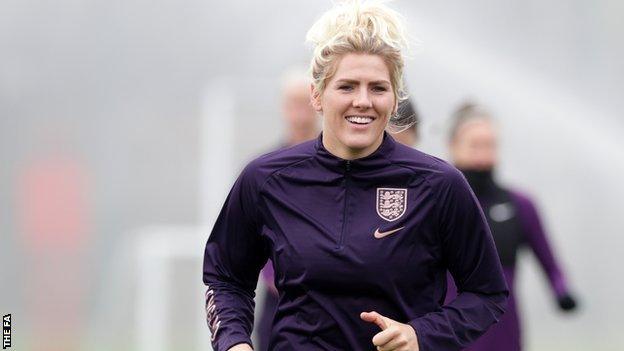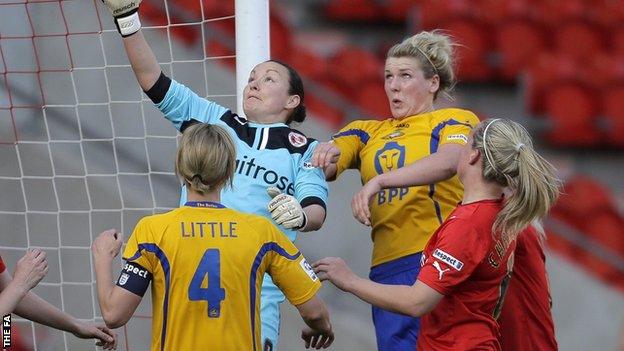Millie Bright column: 'New money is welcome but needs to be shared around'
- Published

Chelsea and England defender Millie Bright will be writing columns for the BBC Sport website throughout the rest of the season, as the national team attempt to win this summer's World Cup in France.
If, like me, you had just found out that your sponsor would pay female players the same bonus for winning the Women's World Cup as their male counterparts, I'm guessing you'd want to find out how much it would be.
I'm the opposite. I'd be nervous to know how much Adidas, who sponsor me, are putting up and, despite a few rumours flying around, I haven't even asked my agent because money is not my motivation and I don't want it to distract me from my focus of winning the tournament with England this summer.
But after Barclays announced it will sponsor the Women's Super League in a multi-million pound deal, and Boots began doing likewise for the home nations and Republic of Ireland women's teams, it shows you that respect levels for the game have never been greater.
Sponsors don't jump on board just for goodwill, it's because they see a commercial value in the sport, and those recent examples are massive for the growth of the game.
We are already at a point where some England players earn six-figure salaries based on their central contracts with England, club wages and commercial deals and bonuses, but the Barclays deal, in particular, sets up a potentially exciting future for this generation and the next one.
When I told my parents that I wanted to be a footballer when I was younger, they said: "Don't be silly," and even when I played at Doncaster Rovers Belles as a semi-professional, they always told me to have a back-up career, which I know was sensible advice.
But we are getting to the point, where, like the men's game, playing football is not only a legitimate career, but enables you to live really well and can perhaps even set you up for life. It will allow little girls to tell their mums and dads they want to be professional footballers, and not have their dreams dismissed so easily.
Women's football deserves this. We have had to earn every penny that comes our way because we don't get the same exposure or rely on the same standing as the men's game.
We understand that it's only by being successful that you get the rewards, and the England team has done that by finishing third at the last World Cup and winning the SheBelieves Cup last month.
Hopefully this is just the beginning, especially if we do well at the World Cup this summer.
My only hope is that the money that comes into the game is distributed evenly, as there were two experiences while at Doncaster that I don't think any player should have to go through.

Millie Bright is back with the England squad after missing out on the SheBelieves Cup through injury and could play against Spain on Tuesday
'Benefits office asked me why I was playing football'
The news about Barclays sponsoring the WSL came in the same week that a top-tier club, Yeovil Town Ladies, went into administration, so it shows you that some clubs still struggle.
I know all about that struggle based on my time at Doncaster, where I was part of the team that in 2013 was told after one game in the season that we would be relegated because we couldn't meet the financial criteria to stay in the top tier. Manchester City took our place.
We had to play a full season knowing that we were going down and that is something I don't want any team to experience again.
It was heartbreaking. It felt like we weren't respected or even wanted in the league, purely based on money. It should be about the level you play at, not how much money you have. That season, we just felt what's the point?
The game is not just about the top four or five teams, it's the whole league that needs to be stable and developing. Without the other teams we are nothing.
Then it's about looking after the division below, too, in the Women's Championship. Players need proper training and medical facilities but there have been stories of players who have had to rely on private medical care, or even crowdfunding, to fix an ACL knee injury.
If you're a footballer, your club should be able to help you with medical needs, and that's where the women's game gets a lack of respect. It doesn't reflect well on women's football at all.
I know about those struggles too. At Doncaster I injured my ankle badly and couldn't walk for three weeks. I was only semi-professional and training twice a week, but I had to go on benefits because I couldn't do my job as a horse groom or work in a leisure centre as a fitness instructor.
I remember the conversation at the benefits centre when they asked me: "Why are you playing football?" I just told them it was my career.
I had some rehabilitation at the club, but my mum and dad helped pay for treatment. I don't know what I would have done without them, but players in that situation should be better supported.
Then there's the stress and the mental health problems you can get when you're out injured and can't work. The club should be able to offer the right support to take those stresses away.

Bright (second right) was a semi-professional footballer at Doncaster Rovers Belles for four years
'Players deserve more'
Lots of players have similar stories about how they have struggled or had two jobs to make ends meet, so when you do finally get a salary, as I did at Chelsea, you feel like you've earned it.
That is why I think that, so long as the money is shared around, players deserve more.
Top players now will get bonuses for winning competitions or reaching various stages of them, scoring goals or keeping clean sheets, but most don't play football for the money because it's not been in the game that long. They do it for the love of playing.
But love only takes you so far. If you assess how the game has developed, it's not only down to the staff and people behind the scenes, but the players. We are the ones who are putting on good performances and making fans want to come back and see more.
Every year there has been progression with the England central contracts; we've just won the SheBelieves Cup and if we won the World Cup you'd expect another step up. There always has to be growth, but that only comes with success, which in turn has led to the recent investment from sponsors.
That's why the Barclays announcement feels like a tipping point and has shown how women's football is heading in the right direction for a long time to come.
But it needs to be shared around so the whole game benefits.
Millie Bright was talking to BBC Sport's Alistair Magowan.